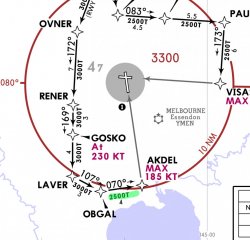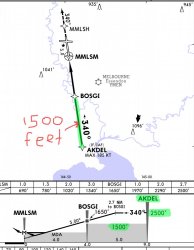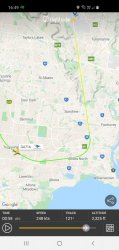travelislife
Established Member
- Joined
- Feb 9, 2011
- Posts
- 2,402
I have plenty! But just making curfew is not as exciting as missing it so here it goes...
This was a standard domestic day, 4 sectors, minimum turnarounds everywhere ending with a “curfew chaser“ (a flight that is scheduled to arrive within 20mins of curfew). Sign on was at 1pm, to do SYD-HBA-SYD-BNE-SYD. Once I’d rocked up to sign on, I checked the status of the aircraft and it was running late, what a great start!
I checked the turnaround times on my briefing report and we had 30mins in HBA, 40mins in SYD and 35mins in BNE with an extra 20mins up our sleeve before curfew. We thought, yep we can get this aircraft back on schedule (currently 20mins late).
As soon as the plane chocks on, the captain goes to do the walk around, while I got the flight plan and came up with a fuel figure to pass on when he got back. As soon as everyone got off the inbound flight I got the flight deck all set up, while cabin crew got into prepping the cabin. Unfortunately, when you run late, it’s VERY hard to make up time. With that we arrive into HBA still 20mins late. A full load of pax to take back to Sydney means we won’t be able to make up time on this sector. No problem we thought, if we can do a 20min turn in SYD we should be ok. We carried a bit more fuel and upped the cruise speed and lowered the altitude a little to try and beat some aircraft inbound from MEL.
As we got closer to SYD, the evening peak hour rush was evident. We got told to hold for at least 10mins. So now we’re 30 mins late. Well this was going well. We told operations on arrival that coming back now to SYD was going to be very tight and if they wanted to get a BNE based crew to fly back to SYD and we overnight in BNE after the next sector. We got a straight NO and that they’ll have us ready to go in BNE. Ok cool, lets get this show on the road. Another full load later and we’re now high tailing it into BNE. We manage to make up about 5mins on that sector (thanks to tailwinds and track shortening and a cancellation of speed restrictions on the descent).
This was going to be tight we now have 10mins up our sleeve to get back to SYD. On the turn in BNE, we only had about 20 pax as the others had been able to be moved onto the earlier flight knowing that we were running late. We managed to get the aircraft turned around in 25mins, and because we are within 20mins of curfew it’s company policy to carry an alternate (BNE/MEL, in this case it’s BNE), now we’re getting someone, and then...
On the pushback I hear a remark from another aircraft asking the ground controller if he’s “inside the gable markers” (gable markers are long white triangular markers that outline the edge of the runway complex. This is greater than the physical surface of the runway itself. If an aircraft is inside the markers then they’re considered to be on the runway) I looked at the captain and told him we might have a problem getting out. We confirmed with the ground controller too and turns out an aircraft had taken the wrong rapid exit and they have managed to snap their nose gear linkage during the very sharp turn.
So now we have an aircraft that’s disabled on the Rapid exit but infringing the runway meaning the runway is now closed. Inbound aircraft are being diverted. We called up operations again and asked if we can get a dispensation for SYD seeing as we are now going to be late getting in. “No joy” was the reply and were told to just give it a go anyway. We taxied out anyway in the hope they could get the aircraft towed away and we could go. There was a TT 320 waiting to depart for MEL, so we politely asked if we could push in given our situation. They held short and we taxied in front ready to go.
It took 18mins to move this aircraft, so 2mins up our sleeve now. We finally get cleared for an immediate take off. As soon as we’re airborne ATC ask us to contact the company. Once we’re at a safe altitude, I called them and they advised that they cancelled the flight. We thought it was a joke seeing as you can’t cancel the flight as we’re barreling down the runway!
We again ask for a dispensation and they said they were working on it but to now continue seeing as we were airborne. We went straight to 28,000ft and cranked up the speed to 0.805 Mach (basically bouncing off the maximum speed at that level).
ATC knew what we were up to and again gave us track shortening and speed cancellations. We managed to hold the 2mins up our sleeve given we were going into a headwind! I listen to the ATIS inbound and it’s still runway 16R. Great! We will make this as it’s a straight in approach. I asked SYD operations again for a dispensation just in case and we were told a hard NO because there were no environmental factors that made us late. Ok press on..still good.
Approach control in SYD ask what time we had for 16R. 1258 UTC (10:58pm). He wasn’t convinced and his screen was showing we would be 15sec late so he vectored us off the approach for a change onto runway 34L. The problem with 34L is there‘s a 20kt tailwind and the maximum for the 737 is 15knots. This is why 16R was the duty runway! That’s ok maybe it’ll die down at the threshold end and we could still get in, we’ve come this far.
By now we’re on final and ATC clear us to land with sneaky “good luck” thrown in. It looked good until at 200ft the clocked ticked over to 1300 UTC (11:00pm), we were done, the wind never got below 20kts and SYD airport curfew now in effect. Snookered.
A standard missed approach was made and we followed the filed plan back to BNE, this time at 39,000ft. We overnighted in BNE and pax’d back home the following day.
Sorry for the long post but that is definitely the most memorable one for me to date. Had we stayed on 16R we would have made it.
We’re not required to wear uniforms to sim sessions, or any ground training for that matter, whether that’s emergency procedures, security, etc.
Interesting! What was the fine to the company if you had landed? As obviously some significant costs returning to origin and putting everyone in hotels.
I have only had the one flight that went Origin to Destination and all the way back to origin. Was ADL-OLP flew all the way there for there to be an issue with the landing gear that we did a fly over of the runway at OLP and then returned to ADL!


















